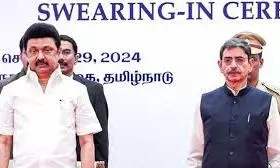
Governor or state government?
text_fieldsThe Madras High Court ruling that the governor is constitutionally bound to accept the decision of the state cabinet is a clear and precise settlement of recurrent disputes between the Governors and the State Governments. A two-judge bench of Justices S.M. Subramaniam and V Shivagnanam delivered the verdict on October 17 saying that while applying Article 161 of the Constitution of India, which empowers the Governor to sentence, grant remission and pardon, the Governor has to accept the decision of the State Cabinet and this has been stated by the Supreme Court in several judgments. Article 161 of the Constitution states that the Governor is not acting on his own but on the recommendation of the State Governments. The governor who is the head of the state should respect the advice of the concerned governments. A separate judgment on this point is not necessary for each case. The High Court pointed out that the courts have earlier ruled regarding the power given by Section 161 to grant acquittal to those facing imprisonment.
Also read: MK Stalin urges Centre to recall Tamil Nadu Governor over anthem controversy
P. Veera Bharathi was sentenced to life imprisonment in the case of raping and killing a 16-year-old girl in 1999. The Tamil Nadu government's decision to release him after 20 years of imprisonment was canceled by Governor R.N. Ravi. The court ruled on a petition filed against Ravi's cancellation. In 1999, along with two other accused in the case, Veera Bharathi was sentenced to death. The High Court heard the appeal of the accused and reduced the sentence to life. One of the accused, Ilango alias P. Murugan was released on March 6, 2024. In August 2023, the MK Stalin-led DMK government decided to grant early release to life prisoners who have served 14 or more years of sentence if they fulfill certain criteria. The government formed a committee to find suitable candidates. It was on their recommendation that Murugan be acquitted in the above case. With that, Veera Bharathi petitioned the government to apply the same verdict to him. The state government gave permission but the governor refused. The governor's observation was that the accused who raped and killed a minor girl did not deserve consideration. Then the convict approached the High Court.
Also read: Chief Minister Pinarayi Vijayan has no credibility: Kerala Guv Khan
This is not the first time that the Tamil Nadu Governor has been 'educated' by the Supreme Court on the Governor's constitutional powers and duties. The Supreme Court had criticized Ravi last March for rejecting the Chief Minister's recommendation to include one person in the state cabinet. Accusing the governor of exercising powers beyond the constitution, the Supreme Court ordered that former minister Ponmudi be reinstated in the cabinet and administered the oath in one day. Then as now, the governor went into the merits of the case and argued that it is against the constitution and morals to reinstate a person tainted by corruption charges. After the Supreme Court upheld the judgment of the Madras High Court, which found the minister guilty of corruption, the Chief Minister recommended his re-entry into the ministry. At the same time, Governor Ravi exercised excessive power by overriding the government and the Supreme Court at the same time.
Also read: Tamil Nadu governor calls secularism a "European concept" unnecessary for India
Misusing governors' powers has become a regular occurrence under Narendra Modi's BJP rule, leading to political clashes and discord in various states. It is a tradition from the times of Congress that the governors will always be at the behest of the Centre and their duty is to carry out the mandates of the ruling party at the Centre. But, the Narendra Modi government has broken all precedents. From former Maharashtra Governor Bhagat Singh Koshiyari, who overturned one cabinet and swore in another in the small hours of the day, to the Governors of West Bengal and Kerala who constantly wield the big stick on the Chief Minister, Ministers, and the Cabinet and try to teach constitutional etiquette, the inconveniences and discomforts created in the administration field have become old news now. The nation expects from the governor a head of a State who provides constructive guidance and cooperation to the administration elected by the people and moves forward with a collective responsibility to enable the achievement of governance for the people and the state, not a rival constantly arguing with the state administration and trying to prove his position and seniority. It is of that constitutional responsibility that the courts are continually reminding.























